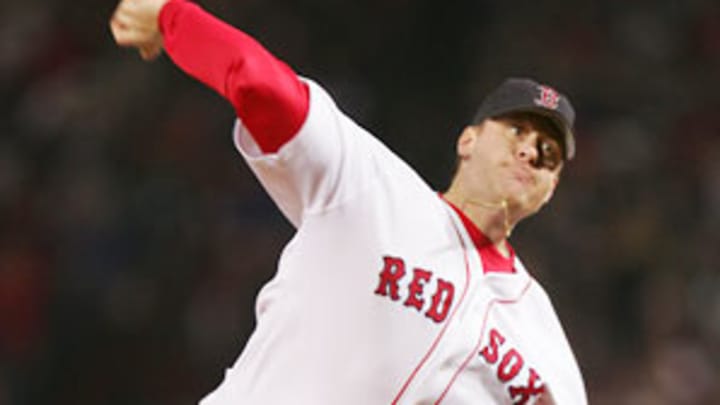Love him or hate him, Curt Schilling stood out in the modern game


No getting away from it: There is too much baseball. When the spring training game is over the international one follows, and afterward there is an interview with a disgraced player at pains to convey contrition. By the time the season starts, it has already been on for months. All the games and players start to look and sound the same.
Curt Schilling, who announced his retirement on Monday, never sounded like anyone else; that was part of his charm and a big reason why so many people hated him. Fans and sports pundits prefer dull players who only say dull things and nod vacantly. Mock the New York Yankees' fraudulent self-mythologizing and several million people will call you a vulgar braggart. Point out that a lot of your fellow players are on drugs and you'll get a reputation for trying to balance your virtue on other people's backs. Cut out the sports pundits by writing your own column and you'll be derided as a self-obsessed blowhard.
The greater part of Schilling's charm, though, and the reason why there were probably even more who revered him than despised him, was that he earned the right to every loud boast and delusional pose with fantastic performances. Throwing his huge chainsaw of a fastball for the Arizona Diamondbacks, he did as much as anyone else to break the back of the late-'90s Yankees dynasty; with Boston he was one of the engines of the greatest comeback in baseball history. In all, he started 19 postseason games and gave up two or fewer runs in 16 of them. Other pitchers have been as good as Schilling in October, but none clearly better.
To just key in on October, though, is to lend credence to the idea that Schilling was little more than a slightly better version of vintage aces such as Jack Morris or Dave Stewart -- merely a fine pitcher who was at his best for high-stakes games. This isn't true. Had he never pitched a single playoff game Schilling would still be a deserving Hall of Famer. He never won a Cy Young Award or led the league in earned run average, and his career record isn't overwhelming. But you don't need to compare him to such dubious Hall cases as Catfish Hunter to make a claim for him. Measured against all but the very highest standard, Schilling's career rates among the best of the post-war era.
Take him against the irreproachable Juan Marichal, a sort of avatar of the days when men were men and men played baseball. Marichal went 243-142 with a 2.89 ERA and 244 complete games in his career. Schilling was 216-146 with a 3.46 ERA and 83 complete games, and yet he had the better career. This hardly takes quantum mechanics to prove; the important thing is the context.
Marichal's most obvious advantage, for instance, is pitching three times as many complete games as Schilling, but there's a good case to be made that Schilling was the stronger horse. Marichal led the league in complete games twice and finished second four times. Schilling led the league four times and ranked second another three. One man pitched in a low-scoring era in which games moved along quickly, the other during a hitter's era in which television ads had slowed the pace of the game down by half.
This makes an enormous difference in the raw numbers -- including Marichal's win total, which is largely a function of his having finished more games -- but relative to their peers, Schilling was more impressive. The same is true of their ERAs. Marichal's advantage of more than a half run per game evaporates when you consider that the park-adjusted league ERA during his career was nine-tenths of a run lower than it was during Schilling's. Account for this, and Schilling was, again, better relative to his peers than Marichal was. Per game, in fact, Schilling was as good as Bob Gibson or Tom Seaver.
There are other arguments for Schilling -- he retired as the modern leader in strikeout-to-walk ratio (4.38), for one -- but in the end, to make them probably misses the point. What matters about him most is that he was memorable, that he stood out from the gray anonymous hordes not only for how well he played but also for the way he played.
At times, in its modern industrial form, baseball can fit Mario Vargas Llosa's description of soccer: "An experience where the effect disappears at the same time as the cause." This cannot be said of the baseball that Schilling pitched, which was the kind that people will be recounting to bored children 70 years from now. When his admirers describe Schilling as a throwback, they're talking more about this than about his iron arm or what we might politely call his confidence. Baseball is worse off without him.
